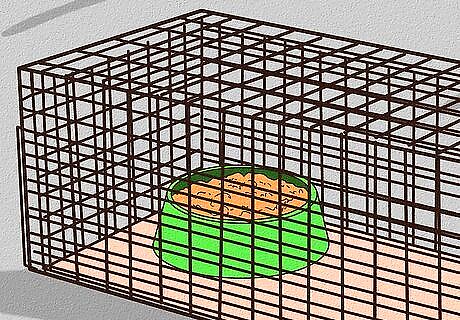
views
Approaching the Kitten

Feed the kitten and its mother. Offer the kitten and its mother food from a bowl at the same time each day. Back away and give them space to eat. Having regular meals and a routine can build the kitten’s trust. This can also ensure that the mother brings out all of her kittens for food so you can choose one. Place an item of yours, such as a sweaty shirt, underneath the food dish. The kitten will associate your scent with good things. Remember that feral kittens are usually mistrusting of humans at first, which can lead to aggression. Give the kitten plenty of space when you feed it and don't rush the process.

Set up a cage trap. Trapping is the safest and kindest way to catch your feral kitten. Purchase or rent a humane cage trap and follow the directions for assembly. Secure the trap door with a cable tie so that you can continue to build trust with the kitten before you actually trap it. If you're trapping a young kitten that's still nursing, you'll need to trap the mother cat along with all of its other kittens. Any kittens you don't trap will starve without their mother.

Move the food to the cage trap. Place the food bowl at the back of the cage trap. Sprinkle bits of cat food at the entrance of the trap and around the base surface. This ensures that the kitten feels comfortable entering the cage. Hide the cage trap under bushes or in another safe spot so that the kitten can confidently enter and exit it.

Trap your kitten. After the kitten feels comfortable entering and exiting the cage, attach a string to the trap door and pull it closed when you’re ready. Stay out of sight of the trap and pull the door shut with the taut string. This can ensure that you don’t trap the kitten in the door or associate you with trauma.

Cover the cage and move your kitten. Place a dark-colored sheet over the trap cage. Pick it up and set it in a quiet, warm room for the kitten. This can calm the kitten before you take it to the vet and release it into your home.

Avoid chasing or grabbing the kitten. Imagine if you were a young kitten that loves and feeds from its mother and enjoys playing with your siblings. Consider what it would feel like if a larger animal started chasing you and grabbed at you. Steer clear of chasing and grabbing kittens if they appear frightened since it can traumatize them and undermine your attempts to gain their trust.

Be patient. It takes time to build trust with feral kittens. Give yourself and the kitten time at least a few days to get used to one another before you trap it. This can ensure that you don’t traumatize the kitten(s) before you bring it home. It also helps build a relationship with the kitten that you can continue once you bring it home.
Getting Veterinary Care

Take the kitten to your vet. Feral cats and kittens are often exposed to parasites and diseases. They may also have wounds. Ensure your kitten’s immediate and long-term health and wellbeing with a vet visit. Do this soon after trapping the kitten to get another potential trauma out of the way. Tell your vet the circumstances under which you captured your kitten. This can help the vet figure out what tests to run, vaccinations to administer, and provide other treatment the kitten may need.

Give your kitten prescribed medication. Many vets will assume feral cats have internal parasites, fleas, and ticks. Administer any medications your vet prescribes. This can ensure that your kitten gets healthy and minimizes the risk of transmitting illness or parasites to other animals. It may also stop excessive crying or meowing. Give your kitten the full course of medication to fully treat any issues and prevent recurrences. Ask you vet about administering medication with as little trauma to your kitten as possible.

Ask about spaying and neutering. Consider having your kitten spayed or neutered as soon as they are at least eight weeks old and weigh a minimum of two pounds. This can prevent unwanted pregnancies if your kitten goes outside or is around other cats.
Comforting Your Kitten

Create a cozy and quiet spot. Give your feral kitten time to get used to its new surroundings. Set up a separate and cozy area where it can sleep, eat, and use the litter box. Use an entire room or provide a partially covered large crate or box. This can ensure your kitten feels safe. It also lets you continue building trust with it. Place a blanket in the area for warmth and comfort. Consider putting a personal item, such as a sweatshirt in the space. This can get it used to your scent.

Give your kitten a box or shelter to hide in. It's important that your kitten has somewhere to hide when you first bring it home. A hiding spot will make it feel safe while it's getting adjusted. Over time, your kitten will get more comfortable with you and start coming out of its hiding spot more.

Feed your kitten. Give your kitten a small amount of canned cat food. Moisten it with milk replacer for up to 10 weeks. The food should be about the consistency of oatmeal. This supports a kitten’s growth and health. It also builds trust and gives you a chance to engage your kitten with petting and praise. Avoid regular milk because this can upset your kitten’s stomach. Put your kitten’s food in ceramic or metal bowls. Some kittens may be sensitive to plastic. Pour a separate bowl of fresh water for your kitten.

Stroke your kitten. Comfort the kitten as it lets you by gently petting its head, neck, and under its chin. Depending on how much trust you’ve built, pick up your kitten or sit next to it while you stroke it. This can calm it and provide reassurance.

Talk to your kitten. Give your kitten praise and chat with it while you pet or hold it. Maintain a soft voice to avoid scaring your kitten. This can give your kitten further comfort and reassurance. Say your kitten’s name often so it gets used to it. For example, “Hi Matilda, you’re such a sweet baby. Do you like it when I pet your belly, Matilda? Oh, you do! What a good kitten you are, Matilda!”

Play with your kitten. Get your kitten simple toys such as a toilet paper roll, toy mice, or balls it can bat with its paws. This can ensure the kitten’s healthy development and strengthen your bond. Avoid any play with sudden movements, which can startle a kitten and undermine your ability to gain its trust. It's okay to play-chase your kitten around, but stop if they start acting scared.

Avoid scolding your kitten. Raised voices or gentle taps can scare any cat. This is especially true of a feral kitten. Avoid yelling at or hitting your kitten. This can traumatize it and weaken your bond. If it does behaviors you don’t like, a firm “no” can let it know to stop.




















Comments
0 comment